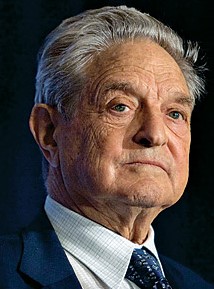An in-depth look at Soros’s influence on global financial markets, political landscapes, and social movements through his investments and activism.
Early Life
George Soros was born on August 12, 1930, in Budapest, Hungary, into a Jewish family. His early life was shaped by the tumultuous events of World War II, during which he experienced firsthand the horrors of Nazi occupation. In 1944, to escape persecution, Soros and his family obtained false identity papers, allowing them to survive the war in hiding. The traumatic experiences of his youth significantly influenced his worldview, instilling in him a deep commitment to social justice and open societies.
Education and Early Career
After the war, Soros emigrated to England, where he attended the London School of Economics (LSE). There, he studied under philosopher Karl Popper, whose ideas on open societies and critical thinking left a lasting impression on him. Soros graduated in 1952 and began his career in finance, initially working for various merchant banks in London.
In 1956, he moved to the United States, where he continued to build his financial career. He worked for firms such as F.M. Mayer and Arnhold and S. Bleichroeder before founding his own hedge fund, Soros Fund Management, in 1970.
Rise to Prominence
Soros’s investment acumen became evident in the 1970s and 1980s, particularly through his innovative strategies and willingness to take calculated risks. He gained international fame in 1992 when he famously shorted the British pound, profiting by over $1 billion during the “Black Wednesday” crisis. This event not only solidified his reputation as a shrewd investor but also made him a target of both admiration and criticism.

George Soros
Philanthropy and Open Society Foundations
In parallel with his financial career, Soros became an influential philanthropist. In 1979, he established the Open Society Foundations (OSF), a network of foundations dedicated to promoting democracy, human rights, and the rule of law around the world. His philanthropic efforts have funded numerous initiatives in education, public health, and civil society, particularly in post-communist Eastern Europe.
Soros’s commitment to social justice is rooted in his belief in open societies, where individuals can express themselves freely and participate in governance. He has been instrumental in supporting democratic movements and has contributed to various causes, including refugee assistance and drug policy reform.
Political Involvement and Controversies
Soros has been an outspoken political activist, particularly in U.S. politics. He has donated substantial sums to progressive causes and candidates, becoming a prominent figure in Democratic politics. His involvement has sparked significant controversy, with critics labeling him as a puppet master behind various social movements and political agendas.
Conspiracy theories surrounding Soros have proliferated, often fueled by his visible philanthropy and criticism of authoritarian regimes. He has responded to these attacks by emphasizing the importance of open dialogue and the need for an informed electorate.
Legacy and Impact
George Soros is a complex figure whose influence extends beyond finance into social and political realms. His financial strategies have reshaped investment practices, while his philanthropic efforts have had a profound impact on global civil society. Despite facing criticism and opposition, Soros remains committed to his vision of an open society, advocating for human rights and democratic values around the world.
As of now, Soros continues to be actively involved in philanthropy and political discourse, emphasizing the importance of addressing global challenges such as inequality, climate change, and authoritarianism.
Conclusion
George Soros’s life story is one of resilience, innovation, and commitment to social justice. From his harrowing experiences in wartime Hungary to his status as a billionaire philanthropist, Soros exemplifies the intersection of finance and humanitarianism. His legacy will likely continue to influence both the financial world and the broader societal landscape for years to come.
